The sword, which dates back 3,200 years, was found at a former fort
By Andrea Vacchiano Fox News
Published September 18, 2024
Archaeology team in Egypt find lion mummy at famed pyramid site
Lion mummy discovered near famous tourist site.
Egyptian archaeologists recently found an ancient sword belonging to the military of Ramesses II, the pharaoh that scholars believe was referenced in the Book of Exodus.
The Egyptian Ministry of Tourism and Antiquities announced the find in a press release on Sept. 5. The excavation took place in Housh Eissa, a city in the Beheira Governorate.
At the site, which is named Tell Al-Abqain, archaeologists found "a series of mudbrick architectural units, including military barracks for soldiers and storage rooms for weapons, food, and provisions from the New Kingdom era."
One of the finds was a bronze sword with the cartouche, or hieroglyphic symbol, of Ramesses. A picture of the sword shows that the artifact has decayed over time, but has still retained the symbol of the Egyptian ruler.
1,000-YEAR-OLD VIKING TREASURE FOUND HIDDEN IN DIRT: 'UNIQUE FINDING'
Published September 18, 2024
Archaeology team in Egypt find lion mummy at famed pyramid site
Lion mummy discovered near famous tourist site.
Egyptian archaeologists recently found an ancient sword belonging to the military of Ramesses II, the pharaoh that scholars believe was referenced in the Book of Exodus.
The Egyptian Ministry of Tourism and Antiquities announced the find in a press release on Sept. 5. The excavation took place in Housh Eissa, a city in the Beheira Governorate.
At the site, which is named Tell Al-Abqain, archaeologists found "a series of mudbrick architectural units, including military barracks for soldiers and storage rooms for weapons, food, and provisions from the New Kingdom era."
One of the finds was a bronze sword with the cartouche, or hieroglyphic symbol, of Ramesses. A picture of the sword shows that the artifact has decayed over time, but has still retained the symbol of the Egyptian ruler.
1,000-YEAR-OLD VIKING TREASURE FOUND HIDDEN IN DIRT: 'UNIQUE FINDING'
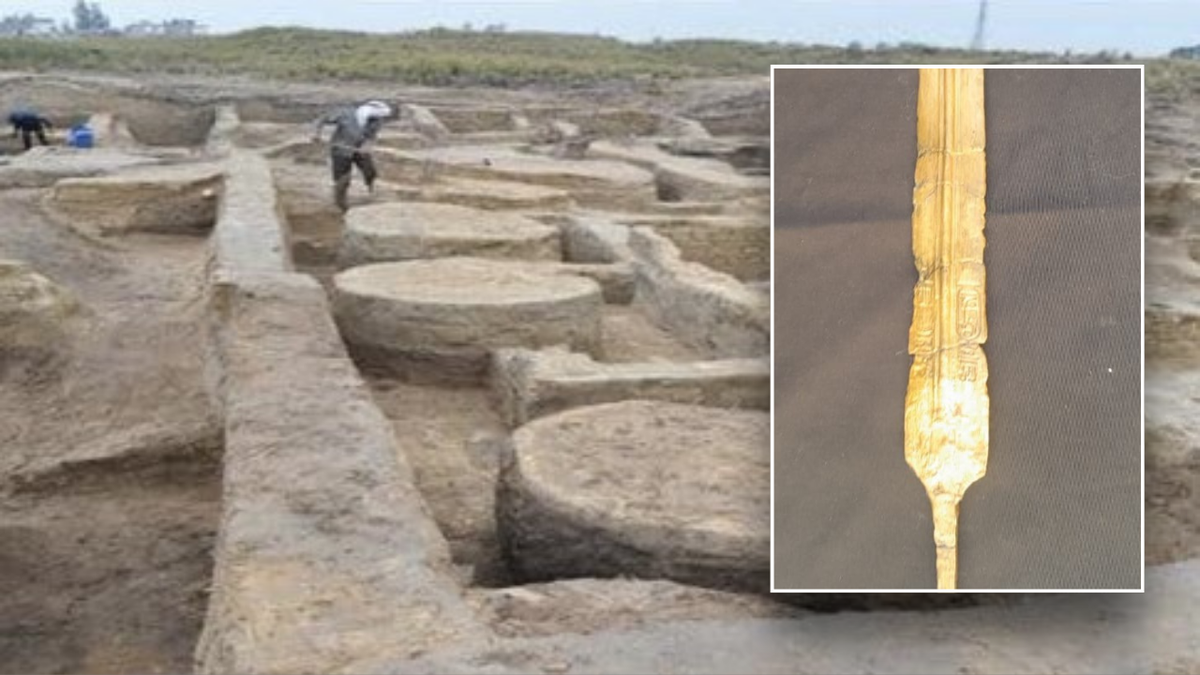
A bronze sword from the time of Moses and the Book of Exodus was found during a recent dig in Egypt. (Egyptian Ministry of Tourism and Antiquities via Facebook)
"In addition to the barracks, numerous artifacts and personal items belonging to soldiers were unearthed," the tourism ministry added. "[These] artifacts provide insight into the daily lives, religious beliefs, and military activities of the fort's occupants."
A range of relics were discovered, from weapons and tools to hygiene items and jewelry.
DIVERS SHOCKED AFTER FINDING 1856 SHIPWRECK OFF COAST OF MASSACHUSETTS: 'NEEDLE IN A HAYSTACK'
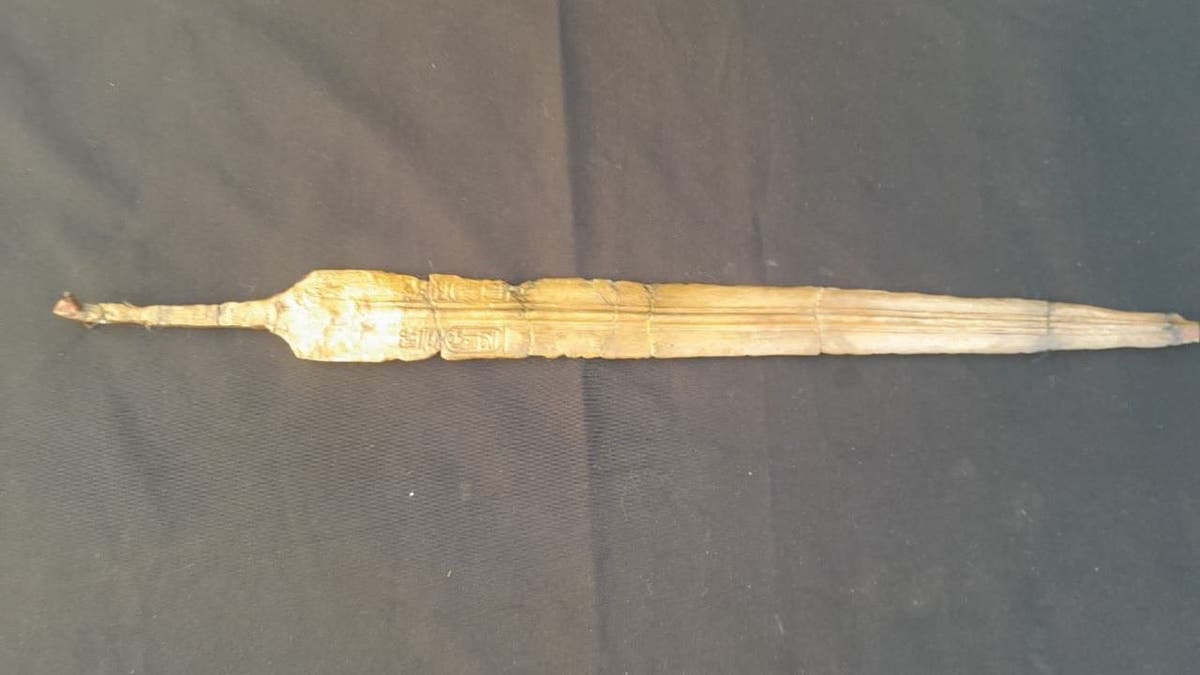
The sword, which bears the symbol of King Ramesses II, is over 3,000 years old. (Egyptian Ministry of Tourism and Antiquities via Facebook)
"These [findings] include weapons used in battle, hunting tools, personal adornments, and hygiene items, such as ivory kohl applicators, carnelian and faience beads, scarabs, and protective amulets," Egyptian officials added.
Ramesses, whose name is also spelled Ramses, was born in 1303 B.C. and died in 1213 B.C. He is believed to be the pharaoh that ruled over Egypt in the Book of Exodus.

The artifacts were uncovered at the Tell Al-Abqain site in Beheira Governorate. (Egyptian Ministry of Tourism and Antiquities via Facebook)
According to biblical accounts, Moses led enslaved Israelites out of Egypt to the Desert of Paran. Although the Bible does not name the pharaoh who interacted with Moses in the Book of Exodus, most scholars believe that the text references Ramesses.
Dr. Mohamed Ismail Khaled, Secretary-General of the Supreme Council of Antiquities, said in the press release that the fort was historically important to Egypt and served as a key outpost. It protected Egyptian borders from the Sea Peoples, which consisted of several tribes that attacked Egypt.
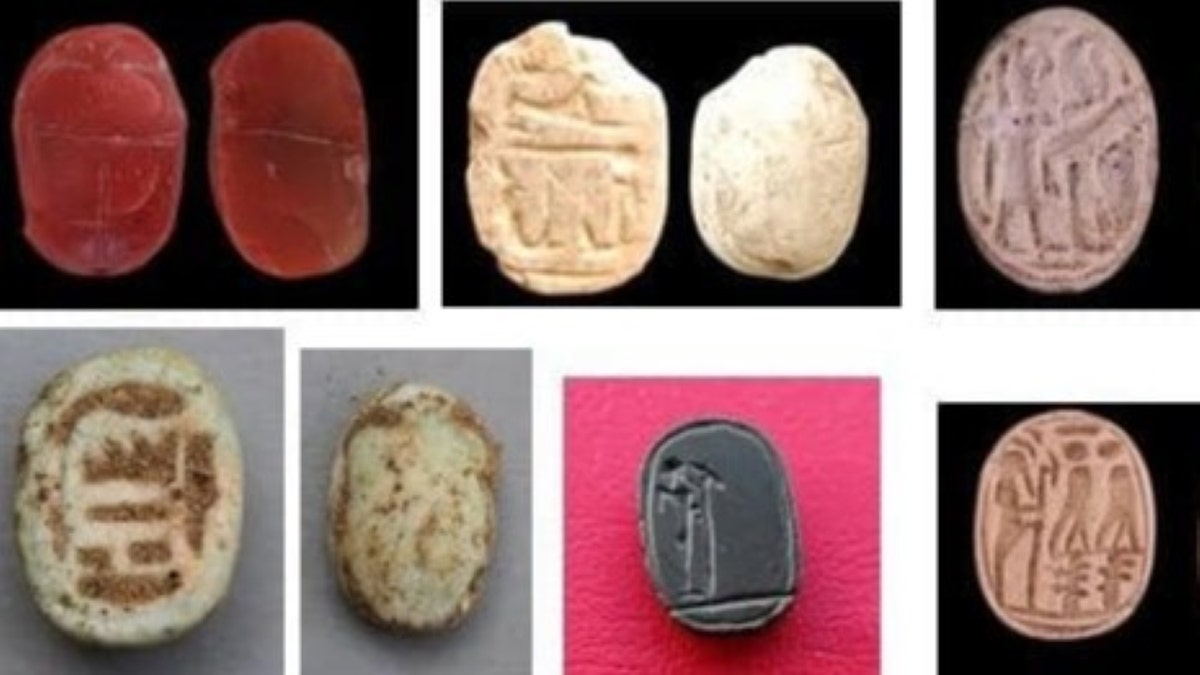
Archaeologists say that the wide range of artifacts uncovered during the excavation reflect the social and religious lives of the soldiers who lived there. (Egyptian Ministry of Tourism and Antiquities via Facebook)
"[T]he architectural units are meticulously designed, divided into two identical groups separated by a narrow passage," the press release explained. "This regular layout demonstrates the ingenuity of the ancient Egyptian engineers in adapting their surroundings to serve a variety of practical purposes."
Artefact from Bronze Age returned to Turkiye after being stolen more than 40 years ago
September 18, 2024
An artefact that was proven to have been illicitly excavated from the Aegean region of Turkiye in the early 1980s and smuggled out of the country was returned Wednesday, via efforts of the Culture and Tourism Ministry, Anadolu Agency reports.
A rare bronze kline – a rectangular couch used in ancient Greece and Rome, dating back to 530 BC – was returned to Turkiye by the J. Paul Getty Museum.
Scientific studies have proven that the historical kline, purchased by a museum in 1982, was illicitly excavated from a grave near Manisa province.
The kline was delivered to the Istanbul Restoration and Conservation Centre and Regional Laboratory Directorate, where it was opened and examined by experts.
Conservator and restorer, Deniz Nurcan told Anadolu that the kline, which dates to the 6th century BC, is one of the rare examples of its kind.
READ: Turkiye repatriates 55 historical artefacts to Iran
“This is a bronze piece. It is produced with a copper and bronze mesh over an iron skeleton, with cast bronze feet. In this sense, it is rare; we typically don’t see such examples,” said Nurcan, who noted that klinas are generally made from stone and wood.
She pointed out that linen fragments adhering to the kline matched precisely with the wooden and bronze plates found by Turkish archaeologists in the grave.
“It is known that it was smuggled abroad in the 1980s. As a result of the joint efforts of Turkish archaeologists and experts from the Getty Museum, the bronze and wooden examples found at the excavation site were matched with the linen fragments on the artefact,
“It was determined that they date to the same period. Thus, it has been established that the artefact is indeed a part of our cultural heritage. The Getty Museum experts sent us a very detailed report. They prepared a meticulous report on the materials and manufacturing techniques. We will first carry out documentation work and conduct our own analyses. We will determine the conservation methods and prepare the artefact for display,” added Nurcan.
Features of kline
The kline is a type of furniture that is rarely encountered.
Such klinas, seen in historical paintings and depictions in pottery from the Bronze Age, were used for resting and dining.
Constructed on an iron skeleton with cast bronze feet and rails, the kline is made up of perforated copper plates.
With its turned legs, protruding tenons at the corners and a lattice surface supporting the cushions, it represents a bronze example of the wooden klinas that were commonly produced during that era.
With the return of the kline, the number of artefacts returned to Turkiye in 2024 has hit 36.
In the last six years, 7,840 artefacts have been returned to Turkiye, and since 2002, a total of 12,155 artefacts have been repatriated.
September 18, 2024
An artefact that was proven to have been illicitly excavated from the Aegean region of Turkiye in the early 1980s and smuggled out of the country was returned Wednesday, via efforts of the Culture and Tourism Ministry, Anadolu Agency reports.
A rare bronze kline – a rectangular couch used in ancient Greece and Rome, dating back to 530 BC – was returned to Turkiye by the J. Paul Getty Museum.
Scientific studies have proven that the historical kline, purchased by a museum in 1982, was illicitly excavated from a grave near Manisa province.
The kline was delivered to the Istanbul Restoration and Conservation Centre and Regional Laboratory Directorate, where it was opened and examined by experts.
Conservator and restorer, Deniz Nurcan told Anadolu that the kline, which dates to the 6th century BC, is one of the rare examples of its kind.
READ: Turkiye repatriates 55 historical artefacts to Iran
“This is a bronze piece. It is produced with a copper and bronze mesh over an iron skeleton, with cast bronze feet. In this sense, it is rare; we typically don’t see such examples,” said Nurcan, who noted that klinas are generally made from stone and wood.
She pointed out that linen fragments adhering to the kline matched precisely with the wooden and bronze plates found by Turkish archaeologists in the grave.
“It is known that it was smuggled abroad in the 1980s. As a result of the joint efforts of Turkish archaeologists and experts from the Getty Museum, the bronze and wooden examples found at the excavation site were matched with the linen fragments on the artefact,
“It was determined that they date to the same period. Thus, it has been established that the artefact is indeed a part of our cultural heritage. The Getty Museum experts sent us a very detailed report. They prepared a meticulous report on the materials and manufacturing techniques. We will first carry out documentation work and conduct our own analyses. We will determine the conservation methods and prepare the artefact for display,” added Nurcan.
Features of kline
The kline is a type of furniture that is rarely encountered.
Such klinas, seen in historical paintings and depictions in pottery from the Bronze Age, were used for resting and dining.
Constructed on an iron skeleton with cast bronze feet and rails, the kline is made up of perforated copper plates.
With its turned legs, protruding tenons at the corners and a lattice surface supporting the cushions, it represents a bronze example of the wooden klinas that were commonly produced during that era.
With the return of the kline, the number of artefacts returned to Turkiye in 2024 has hit 36.
In the last six years, 7,840 artefacts have been returned to Turkiye, and since 2002, a total of 12,155 artefacts have been repatriated.
Early Medieval Metal Workshop Uncovered in Scotland
News September 18, 2024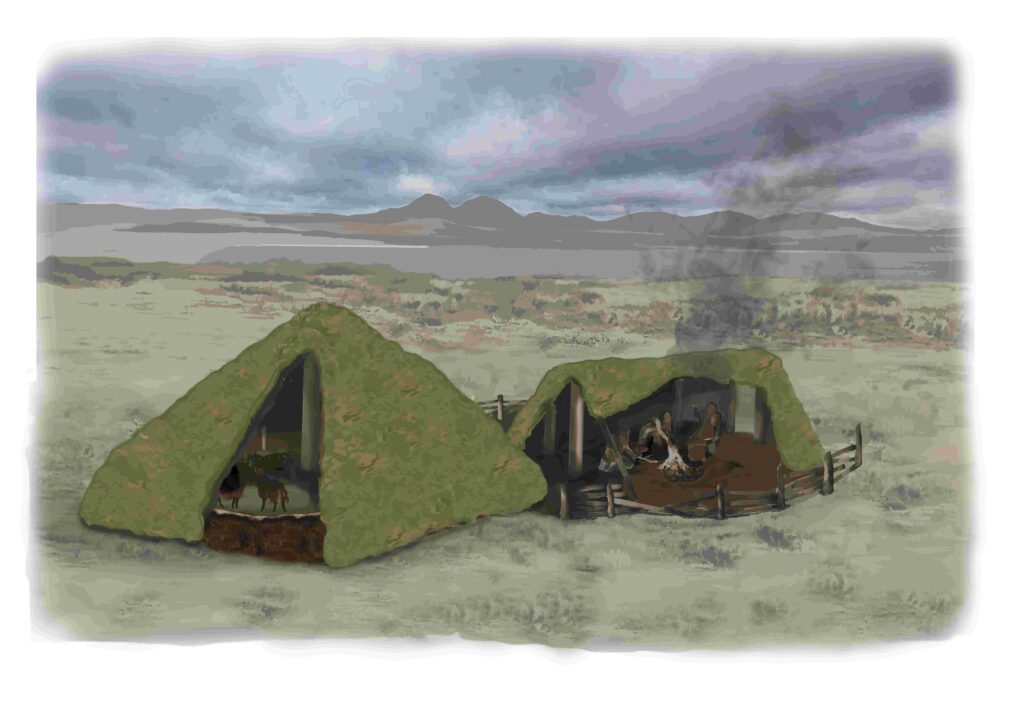
© GUARD Archaeology

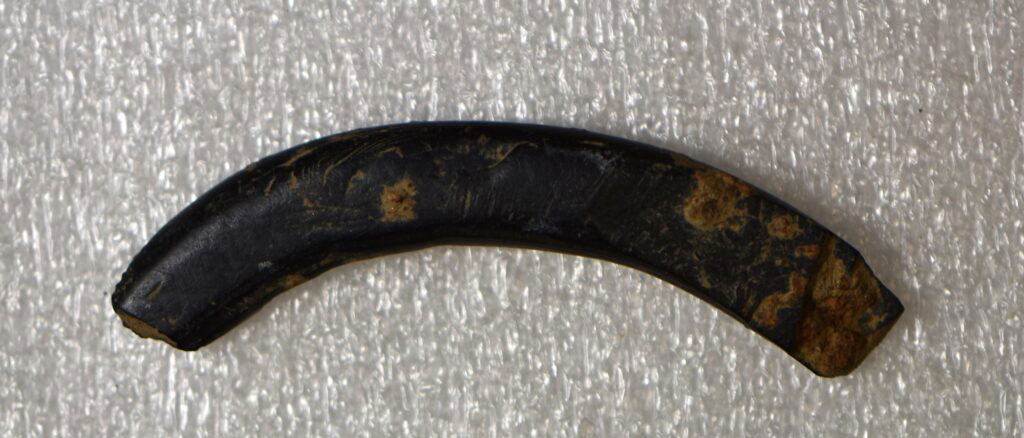
News September 18, 2024

© GUARD Archaeology

Upper part of a rotary quern
© GUARD Archaeology
COULTORSAY, SCOTLAND—According to a report in The National, traces of an early medieval iron smelting workshop belonging to the early Scots kingdom of Dál Riata have been uncovered on the island of Islay by researchers from GUARD Archaeology. The building was used to smelt bog ore to extract iron bloom for making tools and weapons between the sixth and ninth centuries A.D. Metalworking waste, the upper part of a rotary quern for grinding grain, a bone needle, and shale bracelet fragments were also unearthed at the site. The shale bracelets are thought to have been made in central Scotland. An earlier Pictish-style domestic building shaped like a figure eight was found beneath the workshop. “Indeed, it is easy to imagine the early medieval landscape of Islay characterized more by slight buildings such as this, where the majority of the population resided,” explained archaeologist Maureen Kilpatrick. To read about the political landscape of ninth-century Britain, go to "Secrets of Scotland's Viking Age Hoard."
© GUARD Archaeology
COULTORSAY, SCOTLAND—According to a report in The National, traces of an early medieval iron smelting workshop belonging to the early Scots kingdom of Dál Riata have been uncovered on the island of Islay by researchers from GUARD Archaeology. The building was used to smelt bog ore to extract iron bloom for making tools and weapons between the sixth and ninth centuries A.D. Metalworking waste, the upper part of a rotary quern for grinding grain, a bone needle, and shale bracelet fragments were also unearthed at the site. The shale bracelets are thought to have been made in central Scotland. An earlier Pictish-style domestic building shaped like a figure eight was found beneath the workshop. “Indeed, it is easy to imagine the early medieval landscape of Islay characterized more by slight buildings such as this, where the majority of the population resided,” explained archaeologist Maureen Kilpatrick. To read about the political landscape of ninth-century Britain, go to "Secrets of Scotland's Viking Age Hoard."

Shale bangle fragment
© GUARD Archaeology
© GUARD Archaeology
No comments:
Post a Comment